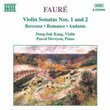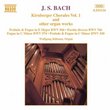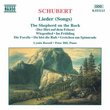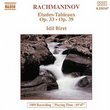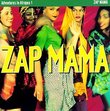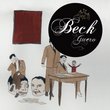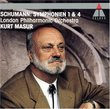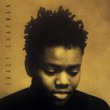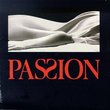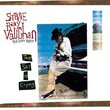| All Artists: Franz Joseph Haydn, Kodaly Quatuor Title: String Quartets, Op. 77, Nos. 1 & 2 Members Wishing: 0 Total Copies: 0 Label: Naxos Release Date: 9/19/1995 Genre: Classical Styles: Chamber Music, Historical Periods, Classical (c.1770-1830) Number of Discs: 1 SwapaCD Credits: 1 UPC: 730099414623 |
Search - Franz Joseph Haydn, Kodaly Quatuor :: String Quartets, Op. 77, Nos. 1 & 2
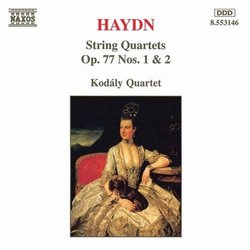 | Franz Joseph Haydn, Kodaly Quatuor String Quartets, Op. 77, Nos. 1 & 2 Genre: Classical
|
Larger Image |
CD DetailsSimilar CDs
Similarly Requested CDs
|
CD ReviewsExploring the Haydn Quartets -- Opus 77 No. 1 & 2 Robin Friedman | Washington, D.C. United States | 02/02/2005 (5 out of 5 stars) "Haydn composed his opus 77 string quartets (there are only two) in 1799 and dedicated them to Prince Lobkowitz, who would also become a major patron of Beethoven. They are Haydn's last completed works in this form. Together with opus 76, the opus 77 works constitute the summit of Haydn's achievement in the string quartet. These two works are closely and intricately written with detailed part writing, counterpoint, and creative use of the sonata form. They manage to be both spacious and spare in structure. Yet for all their seriousness and craft, the opus 77 quartets are a delight to hear. Haydn had the extraordinary ability to be both accessible and deep. The quartets work at the level of the musical involvement of the listener. Put another way, Haydn had the ability to convey both cheerfulness and high seriousness in his music. This ability is at its height in these two quartets. Haydn scholar Karl Geringer observed in his study of the composer that these quartets were written "when true expression seemed more important to Haydn than a perfect balance between form and content." (Haydn: A Creative Life in Music at 323) There are not many individual recordings of the opus 77 quartets. Thus it is doubly fortunate that they are available in an outstanding reading by the Kodaly Quartet as part of its cycle of the Haydn quartets and that the CD sells for a budget price on the Naxos label. The first quartet in G major opens with an allegro moderato featuring a lilting first theme in the violin over a brushing accompaniment. The violin and the cello soon join in a dialogue over the theme. The exposition is expansive and lengthy but detailed at the same time. After a broad development section which moves widely among different keys, the exposition returns in a much-shortened recapitulation. The second movement is an adagio in a remote key from the opening movement. It features a singing theme given to the cello, and the meditative character of the movement is punctuated by several long pauses. The movement is serene, and it glows. The third movement is a minuet, which in both this quartet and the second quartet, is brusque and rapid almost in the manner of a Beethoven scherzo. This minuet features a gypsy-like theme. The finale is a rapid, lively presto with a great deal of counterpoint and interplay among the voices. The movement is througout based on the theme announced at its opening. The second quartet of opus 77 is in F major and strikes me as more serene than its companion. The first movement, allegro moderato, begins with a single chord which is followed by a lyrical theme, and a slower-paced secondary theme. The movement develops tension during the development which ends in a minor key before returning to the opening material. The second movement of this quartet is the minuet which, again, is quick, rough and brusque. The contrasting trio is smoother in character and is placed in the lower part of the register of the instruments. The third movement, andante, is taken at a walking pace with a theme that grows in intensity as it proceeds. After a dramatic stop, the them is repeated in the cello accompanied by a lovely filigree in the violins. The finale, vivace assai, opens with a loud unison chord followed by a quirky, gay theme that is used throught the movement and subjected to contrapuntal treatment. It reaches a large climax, pauses, and rushes on to a light, joyful close. Haydn was a masterful composer of string quartets and these, his final efforts, are among his greatest. They constitute pure music at its best and are full of the sheer joy and craft of music-making. Those listeners who would like to enhance their enjoyment of this music by reading a short but perceptive recent appreciation of Haydn may find rewarding Terry Teachout's article, "Haydn!" in the January, 2005 issue of "Commentary". " For $9.00 This Is a Steal! Andrew DiGelsomina | Creation Croatia | 05/31/2007 (5 out of 5 stars) "These quartets, along with op.76, were obviously a massive influence on Beethoven's op.18 set. In my opinion. they completely overwhelm Beethoven's early output as a whole and pushed Ludwig Van to achieve greatness in his middle period. It's apparent that the reason that Beethoven couldn't learn much from his lessons with Pappa Haydn was because the latter was really busy composing some of his greatest masterpieces like these quartets and the "Creation". The performance here is excellent, perhaps a bit trebly and refined. But most music lovers want that from the recordings of Mozart and Haydn, which is just fine. And the compositions themselves are jaw-dropping...full of fascinating complexity, pre-Romantic era tidbits (check out the remote key changes throughout), and mature wit and style. " Correct but Lifeless Giordano Bruno | Wherever I am, I am. | 06/23/2010 (2 out of 5 stars) "Old Papa Haydn had more life in his fingers when he composed the two string quartets Opus. 77, his last finished works in the genre, than the Kodaly fiddlers had in theirs when they recorded this performance. There's nothing faulty in either of the two "Lobkowitz" quartets -- no bad notes, no improper intonation -- but nonetheless the recording is a disappointment. Fortunately it's an inexpensive disappointment for me, since I bought it as part of the Kodaly 25-CD box of "Complete String Quartets" released by Naxos. Most of the disks in that bargain box are conservatory-perfect in technique, and sprightly enough in interpretation, but I sadly fear the Kodalys "mailed' this one in. It's too stiff in the joints, too formal, too cautious for Haydn's nearest approach in time and in manner to Romanticism.
For a revealing comparison, you need to hear the CD of "Haydn's Last Quartets" performed by the ensemble L'Archibudelli. Even playing at chamber pitch A=415 on their mellower gut strings, Archibudelli brings hot-blooded vigor and emotional resonance to these generously extended quartets, precisely the affective commitment that the Kodaly foursome forget to carry to the studio. Two stars may seem a harsh rating but I mean it to express a certain censure of such perfunctory musicianship. If you can't find or afford the Archibudelli recording, there are several others, including one by Quattuor Mosaiques, far more worthy of your listening time than this one." |

 Track Listings (8) - Disc #1
Track Listings (8) - Disc #1
